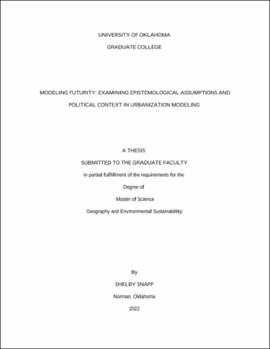| dc.contributor.advisor | Koch, Jennifer | |
| dc.contributor.author | Snapp, Shelby | |
| dc.date.accessioned | 2022-05-09T20:03:25Z | |
| dc.date.available | 2022-05-09T20:03:25Z | |
| dc.date.issued | 2022 | |
| dc.identifier.uri | https://hdl.handle.net/11244/335643 | |
| dc.description.abstract | Computer simulation models projecting urban expansion are useful for academics, planners, and stakeholders interested in land use patterns and their future implications. Although urban simulation models are being expanded to account for complex political dynamics present in the landscape, none have explored potential relationships between tribal borders and urbanization. In addition, each simulated output of such models examines only one possible future. It is important to recognize and critically engage with assumptions made throughout the modeling process, especially in Oklahoma where specific political processes such as land runs and allotment of tribal lands may have affected the physical landscape. Through calibrating an urban simulation model to Oklahoma, I examine any deviant spatial patterns in the landscape between tribal and non-tribal land, and critically engage with the modeling process. I do so by examining three key input datasets used to parametrize the model and I uncover epistemological assumptions that are absent of Indigenous epistemologies or are rooted in violence toward Indigenous people. In analyzing assumptions present in the three datasets, I also illustrate how alternative datasets could potentially be used to express planning priorities that align with Indigenous planning goals. This research is important because adding historic and modern political context to the modeling process may lead to widening the kinds of knowledge that are considered during the process going forward which can address questions of equity in planning processes. | en_US |
| dc.language | en_US | en_US |
| dc.rights | Attribution-NonCommercial-ShareAlike 4.0 International | * |
| dc.rights.uri | https://creativecommons.org/licenses/by-nc-sa/4.0/ | * |
| dc.subject | Urban Simulation Modeling | en_US |
| dc.subject | Knowledge Production | en_US |
| dc.subject | Land Use Land Change | en_US |
| dc.title | Modeling futurity: examining epistemological assumptions and political context in urbanization modeling | en_US |
| dc.contributor.committeeMember | Smith, Laurel | |
| dc.contributor.committeeMember | Harjo, Laura | |
| dc.date.manuscript | 2022 | |
| dc.thesis.degree | Master of Science | en_US |
| ou.group | College of Atmospheric and Geographic Sciences::Department of Geography and Environmental Sustainability | en_US |

